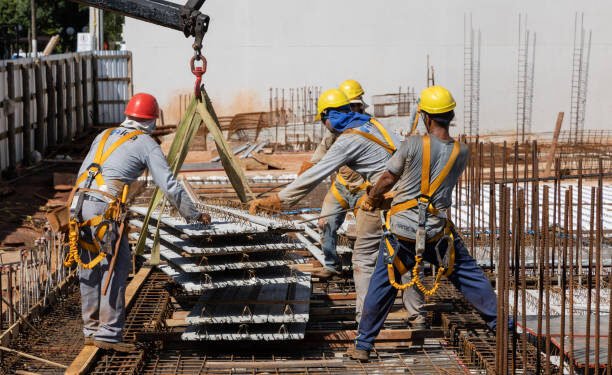Did you know that skilled and even semi-skilled construction workers in Singapore can earn more than $2,500 monthly, with housing, meals, and overtime included? In a country known for its rapid development and modern skyline, construction jobs are not only in high demand but also well-paid, especially for those willing to work hard and learn fast. Whether you’re a local tradesperson or an international jobseeker looking for visa sponsorship, Singapore’s booming infrastructure sector in 2025 and beyond could be your ticket to financial stability.
Overview of the Construction Industry in Singapore
Singapore’s Ongoing Urban Development and Infrastructure Growth
In 2025, the construction industry in Singapore has been regarded as one of the pillars supporting the city-state’s ongoing transformation. Projects such as the North-South Corridor, Changi Terminal 5, new MRT lines, and HDB flat developments have been continuously executed. The Public Sector Infrastructure Work Plan released by the Building and Construction Authority (BCA) has projected steady growth, creating abundant job openings.
Government-Funded Projects and Private Sector Demand
Both government and private developers have been responsible for a growing demand for manpower. Smart city infrastructure, green buildings, and major residential expansions have driven consistent labor requirements, particularly for foreign workers in mid- to low-skilled segments.
Current Shortage of Skilled and Semi-Skilled Labor
A labor gap has persisted due to declining interest among local youth and restrictions on new foreign entrants during past pandemic years. This shortage has pushed employers to increase salaries and offer better living conditions to attract both foreign and local talent.
Why Construction Jobs Are Paying More in 2025
Rising Wages Due to Labor Shortages
The scarcity of qualified construction workers has led employers to offer more competitive salaries. Workers with specialized skills such as crane operation or welding have been especially valued and compensated accordingly.
Government Regulation for Better Working Conditions
Regulations by Singapore’s Ministry of Manpower (MOM) have ensured that foreign workers are paid fairly and provided safe living and working conditions. Regular audits and labor inspections have discouraged exploitative practices.
Demand for Faster Project Delivery and Quality Labor
With multiple mega-projects racing toward completion before the end of the decade, there has been urgency in hiring competent workers to meet deadlines. Workers with previous international experience or certifications have been paid premium wages.
COVID-19 Impact and the Push for Skilled Foreign Workers
Due to earlier restrictions, a backlog in construction timelines was created. Employers in 2025 have attempted to fill those gaps by sponsoring foreign workers under various passes, with higher salaries offered to speed up recruitment.
Types of High-Paying Construction Jobs Available
General Laborers and Construction Helpers
General laborers have assisted with site preparation, material movement, and basic tasks. While not requiring formal training, experience has increased chances of employment and better pay.

Scaffolders, Steel Fixers, and Formwork Carpenters
These semi-skilled roles have demanded practical training and attention to safety. Workers skilled in scaffolding and formwork have been essential for high-rise construction and paid handsomely for precision and efficiency.
Crane Operators and Heavy Machinery Handlers
Workers who have received valid licenses for crane or forklift operation have been in demand for their ability to maneuver equipment safely in congested construction environments. This category has included some of the best-paid workers.
Site Supervisors and Foremen (With Experience)
Supervisors have managed teams, ensured productivity, and maintained safety compliance. Foremen with leadership and bilingual abilities have received higher compensation due to their role in managing diverse multicultural teams.
Safety Officers and Quality Control Technicians
With safety being a priority, these roles have been necessary to avoid downtime or violations. Certification from recognized institutions and past experience has secured attractive salary packages.
Electricians, Welders, and HVAC Technicians
Construction of modern buildings has required specialized trade professionals. Certified welders, HVAC installers, and licensed electricians have seen steady demand across residential, commercial, and industrial sectors.
Average Salary Range by Role in 2025
Entry-Level Roles: SGD $1,800 – $2,200/month
General helpers and cleaning crew have typically earned within this range. Bonuses and overtime payments have pushed monthly earnings higher.
Skilled Trades: SGD $2,500 – $3,800/month
This group has included carpenters, scaffolders, and steel benders with more than two years of experience. Technical know-how and productivity have determined earnings.
Specialized Machine Operators: SGD $3,500 – $5,000/month
Crane operators and excavator drivers with certification have received some of the highest compensation due to equipment risk and skill intensity.
Supervisors and Inspectors: SGD $4,000 – $6,500/month
Multilingual site supervisors and safety inspectors have been rewarded for managing teams, documentation, and safety compliance. Their salaries have reflected accountability and leadership.
Overtime, Bonuses, and Benefits Breakdown
In most cases, workers have been entitled to 1.5x pay for overtime, weekend work incentives, annual bonuses, and medical coverage. Some employers have offered air-ticket allowances for foreign workers returning home annually.
Eligibility Requirements for Foreign Workers
Work Permit or S Pass Holders: Criteria and Age Range
Foreigners aged 18 to 50 have been eligible for construction jobs through work permits or S Passes. Criteria have included physical fitness, basic schooling, and skills certifications for specific trades.
Job Offer and Employer Sponsorship
A job offer from a MOM-licensed employer has been mandatory. The employer must have applied for a valid work pass on behalf of the candidate.
Health, Background, and Security Checks
Applicants have undergone medical screenings, HIV tests, and background checks. Any past visa violations or criminal history may have resulted in rejections.
Minimum Education or Skills Certification
While general workers have not needed formal education, most tradesmen have provided training certificates, preferably from MOM-recognized institutions in their home countries.
Top Employers and Projects Hiring in 2025
Leading Construction Companies with Foreign Worker Quotas
Companies such as Woh Hup, Lum Chang, Tiong Seng, and Hyundai Engineering have actively hired and sponsored foreign construction labor in large numbers.
Government-Backed Housing (HDB), MRT Expansions, and Ports
With over 20,000 new flats scheduled for completion and MRT extensions underway, manpower demand has surged. HDB projects and the Tuas Port expansion have offered job security and consistent pay.
Integrated Resort Developments and Smart City Projects
Resorts World Sentosa and other smart commercial precincts have generated opportunities for electricians, safety inspectors, and green construction roles.
How to Apply for Construction Jobs in Singapore
Job Portals
Applicants have used MyCareersFuture, JobStreet Singapore, and Indeed to find listings. Job descriptions have included details on sponsorship, accommodation, and hourly pay.
Licensed Recruitment Agencies for Foreign Workers
Agencies licensed by MOM have matched foreign jobseekers with construction companies. Fees, contracts, and terms have been made transparent to avoid exploitation.
Steps to Secure an Employment Contract and Pass Application
After shortlisting by the employer, candidates have signed an employment contract. The employer has applied for the work permit or S Pass. Once approved, entry has been permitted under specified conditions.
Timeline and Costs of the Hiring Process
On average, it has taken 4 to 6 weeks from job offer to work pass issuance. Most fees have been covered by the employer, while candidates have budgeted for health checks, airfare, and visa stamping.
Visa Sponsorship for Construction Workers
Work Permit (for Basic-Skilled Workers)
Foreign workers from countries like Bangladesh, India, China, and Myanmar have commonly entered under the work permit. This visa has required no formal education but has limited job changes and family privileges.
S Pass (for Mid-Level Skilled Workers)
Candidates with more experience or trade certifications have been offered the S Pass. This pass has allowed for higher salaries, PR application eligibility, and dependent sponsorship.
Employer’s Role in Processing and Costs Involved
Employers have submitted application forms, security bonds, and levy payments. They have also arranged housing, insurance, and return airfare for their workers.
Common Countries Recruited
Top source countries have included Bangladesh, India, China, Myanmar, and Malaysia. Their vocational training systems have been aligned with MOM standards.
Work Conditions and Worker Rights in Singapore
Standard Work Hours, Overtime Rules, and Weekly Rest
Standard working hours have been 44 per week, with overtime legally capped. Workers have been entitled to one rest day per week and paid leave annually.
Free Accommodation, Meals, and Transportation
Under law, employers have provided dormitory accommodation or housing allowances. Meals or cooking facilities have also been included. Transport to the job site has been arranged daily.
Safety Regulations and Worker Protection Laws
Stringent safety rules have been enforced under the Workplace Safety and Health Act. Training, helmets, and protective gear have been mandatory.
Dispute Resolution and Reporting Abuse
Workers have had the right to report labor violations to MOM. The Migrant Workers’ Centre and NGOs like HOME have provided free legal support.
Upskilling and Career Growth in the Construction Sector
SkillsFuture Training Programs and Certification Schemes
Foreigners on S Passes have been eligible for SkillsFuture training. Courses in electrical installation, safety supervision, and digital tools have increased employability.
How Workers Move from General Labor to Supervisory Roles
Career progression has been encouraged for consistent performers. With good evaluations and course completion, general workers have been promoted to foremen.
Opportunities for Permanent Residency and Long-Term Employment
S Pass holders have applied for Permanent Residency (PR) after 2–4 years of employment. This transition has opened doors to more stable jobs and family relocation.
Challenges Faced by Construction Workers and How to Overcome Them
Language Barriers and Communication on Site
Multilingual teams have often faced miscommunication. Workers have been encouraged to learn basic English or Mandarin for improved safety and productivity.
Harsh Weather Conditions and Physical Labor Demands
Singapore’s heat and humidity have made outdoor work exhausting. Hydration, protective gear, and regular breaks have been implemented to mitigate heat stress.
Common Workplace Injuries and Safety Tips
Falls, machinery accidents, and slips have remained common. Following training, wearing PPE, and staying alert have been essential for safety.
Coping with Homesickness and Worker Mental Health
NGOs and community centers have supported emotional well-being through helplines, workshops, and social gatherings.

Conclusion
The construction sector in Singapore has offered a wealth of opportunities in 2025 and coming years, not just for local tradesmen but also for hardworking foreign workers. With wages rising and work conditions improving, this sector has become a gateway to long-term employment and financial growth. By understanding eligibility, applying through legitimate channels, and investing in skill development, candidates have positioned themselves for success in one of Southeast Asia’s most advanced cities.
Prospective applicants are encouraged to begin their job search early, gather the necessary documents, and consider both entry-level and certified pathways based on their experience and training.


















